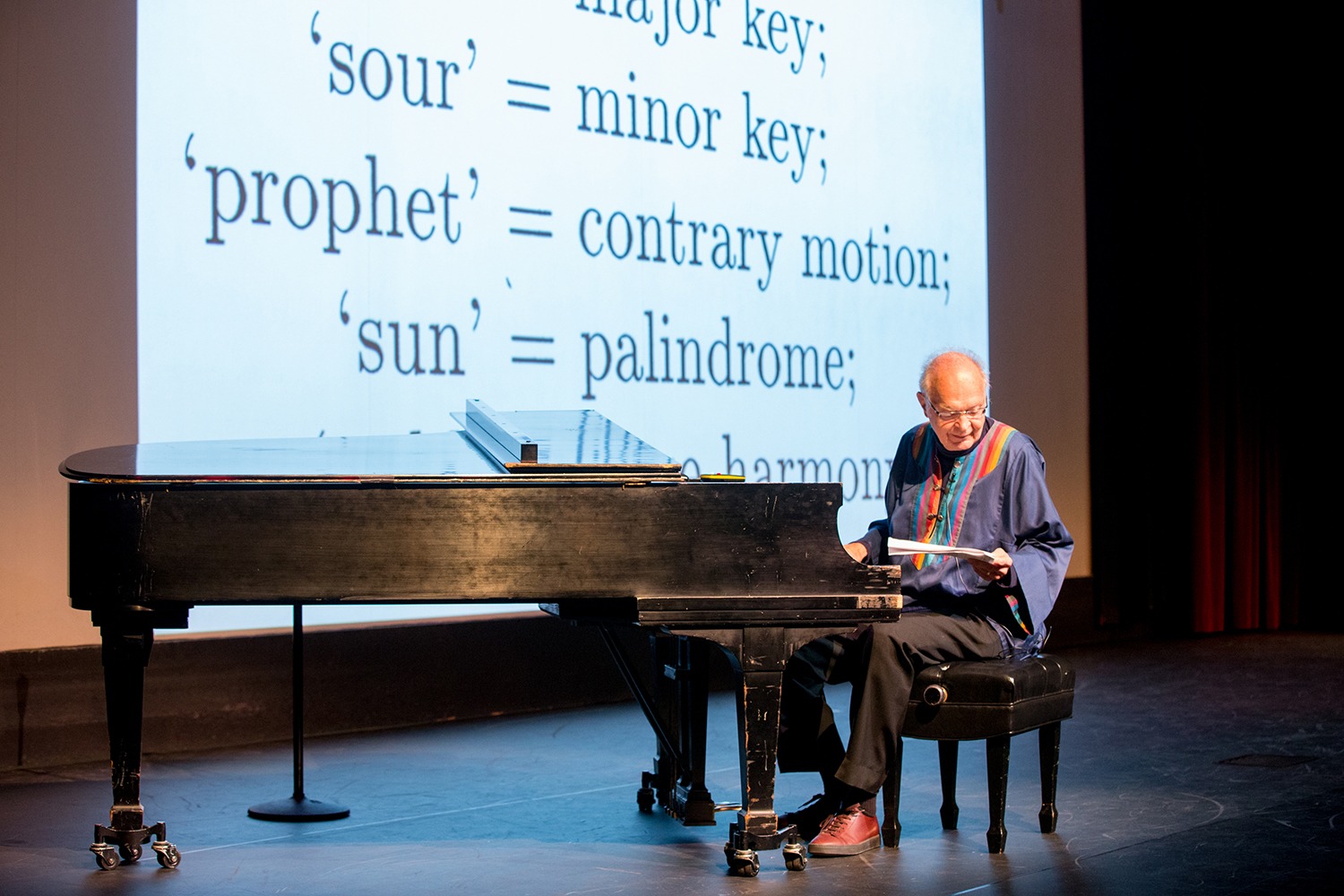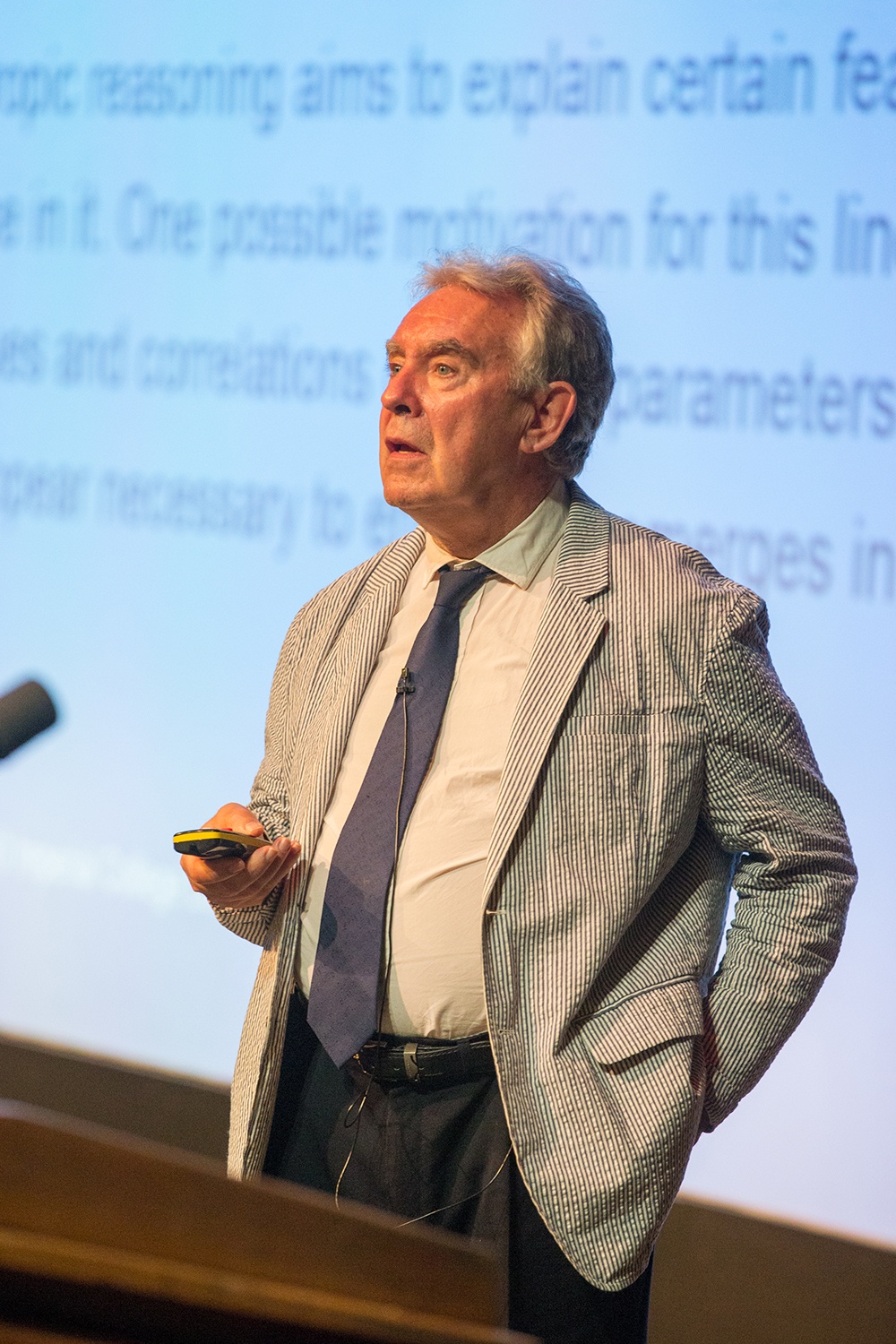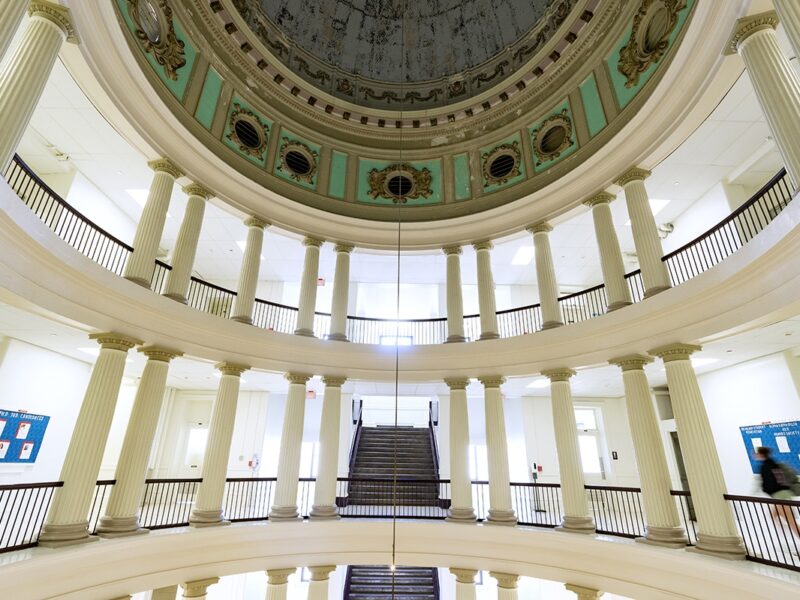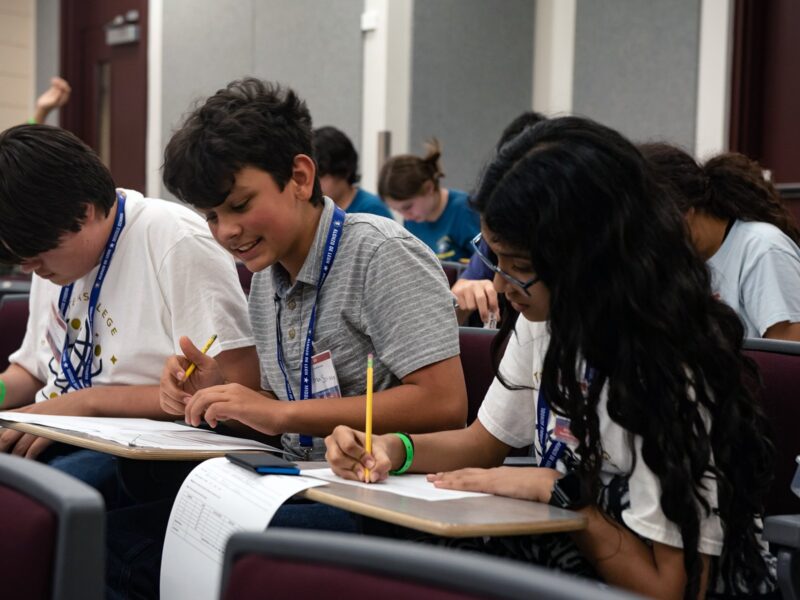
Hundreds of people recently capitalized on a free opportunity to explore the crossroads of science and religion at the 2017-18 Trotter Lecture, held April 17 in Rudder Theater at Texas A&M University and featuring Stanford University computer scientist Dr. Donald Knuth and Imperial College London theoretical physicist Dr. Michael Duff.
Knuth, a professor emeritus at Stanford, is known as the father of algorithm analysis and the creator of the popular TeX computer typesetting system, among other programming books. He presented “Translating the Bible into Music,” which explored his recent composition Fantasia Apocalyptica that converts the Greek text of the Revelation of Saint John the Divine into pipe organ music with a bonus beyond its intricate programming — spiritual insight for the 21st century.
Duff, also an emeritus professor at Imperial as well as a pioneering supergravity theorist known for coining the term “p-brane” to describe one facet of dimensional volume in spacetime, was returning to the campus he previously spent a decade at as a professor during the 1990s. For his presentation, “The Best of All Possible Worlds,” Duff drew from his more than four decades of research spanning the fundamental forces and electromagnetic fields governed by the rules of quantum mechanics to explain why he believes the universe seems tailored for creatures like us.
Knuth opened his talk and the lecture portion of the event by detailing how he first mapped out the word usage in a work that has proven inspirational for many classical composers, then assigned musical hooks – recurring short series of notes — to those words which were representative of their meaning as well as different styles of music, from baroque and classical to folk and jazz. To help explain how the music was integrated from an algorithm, he turned to a nearby piano, playing several hooks from his composition, which recently made its world premiere in Sweden on his 80th birthday — January 10, 2018.
“Forty-five years ago I took a class in computer science at Stanford from Dr. Knuth, and after 45 years, I was able to meet him again,” said Texas A&M astronomer Dr. Nicholas B. Suntzeff, who earned a bachelor’s of science degree in mathematics from Stanford in 1974. “Although some scientists might not readily recognize him, many of them use his software every week and perhaps every day. He is one of the most influential computer scientists of the 20th century and someone who can safely be called a genius.”
For his part, Duff took the Rudder Theater audience through the history of elemental particles and forces, starting with Sir Isaac Newton and leading up to developments in the 21st century by people such as Steven Hawking and others, including Duff himself. He concluded his talk by asking some fundamental questions about the role of faith in doing science and describing the influence that faith had — or didn’t have — on several very influential physicists over the centuries.

“My wife Melissa and I did not know what to expect, but we were blown away,” said Dr. Mark A. Hussey, professor of soil and crop sciences and former dean of the Texas A&M College of Agriculture and Life Sciences. “While we very much enjoyed Knuth’s music, it was Duff’s talk that frankly was off the charts for both of us.”
The following day (April 18), both speakers presented College of Science-sponsored talks within the Stephen W. Hawking Auditorium that were preceded by an 11:30 a.m. reception. Afterward, Knuth also visited the Department of Computer Science and Engineering, where he met with faculty and then was celebrated in a second reception featuring both faculty and students to close out his trip to Aggieland.
Knuth, a professor of computer science at Stanford since 1968, is a member of the National Academy of Sciences, the National Academy of Engineering, the American Academy of Arts and Sciences and the American Philosophical Society. He earned bachelor’s and master’s degrees from Case Institute of Technology in 1960 and his Ph.D. from the California Institute of Technology in 1963. As a graduate student, he accepted a commission to write a book on compilers for computer languages that eventually became the multi-volume The Art of Computer Programming. In addition to making fundamental contributions in several branches of theoretical computer science, Knuth’s software systems TeX and METAFONT (MF) are extensively used for book publishing throughout the world. He also created the WEB and CWEB computer programming systems designed to encourage and facilitate literate programming.
Knuth is the author of five volumes of Computers and Typesetting, nine volumes of collected papers and a non-technical book entitled 3:16 — Bible Texts Illuminated. That book led to another, Things a Computer Scientist Rarely Talks About, which contains transcripts of six lectures that he presented at MIT in 1999 about the relationship between faith and science.
Duff has served since 2005 as principal of the Faculty of Physical Sciences and Abdus Salam Professor of Theoretical Physics at Imperial College London, where he received his Ph.D in theoretical physics in 1972. In addition to an emeritus professor, he is Senior Research Investigator at Imperial and a visiting professor of mathematics at Oxford University, where he holds a Leverhulme Emeritus Research Fellowship. Duff completed postdoctoral fellowships at Trieste, Oxford, King’s College London, Queen Mary College London, and Brandeis University before returning to Imperial College in 1979 on a Science Research Council Advanced Fellowship, joining the faculty there in 1980. He took a leave of absence to visit the Theory Division in CERN, first in 1982 and again as a staff member from 1984 to 1987, when he became senior physicist.
A fellow of the Royal Society of London, the American Physical Society, the Institute of Physics and the Royal Society of Arts, Duff spent a decade as a professor of physics at Texas A&M from 1988 to 1999, earning appointment as a distinguished professor in 1992. In 1999, he moved to the University of Michigan, where he was Oskar Klein Professor of Physics and director of the Michigan Center for Theoretical Physics from 2001 to 2005, when he returned to Imperial. He also has held visiting professorships and fellowships at the University of Texas at Austin; the University of California, Santa Barbara; the University of Kyoto; and the University of Cambridge’s Isaac Newton Institute.
The Trotter Prize and Endowed Lecture Series, presented by the College of Science in collaboration with the College of Engineering, seeks to illuminate connections between science and religion, often viewed in academia as non-overlapping if not rival world views. The series was established by Dr. Ide P. Trotter Jr. ’54 and Luella H. Trotter with a matching contribution from ExxonMobil Corp. in 2001 to honor Ide P. Trotter Sr., former dean of Texas A&M University’s Graduate School, and to recognize pioneering contributions to the understanding of the role of information, complexity and inference in illuminating the mechanisms and wonder of nature.
###
This story by Shana K. Hutchins originally appeared on the College of Science website.





